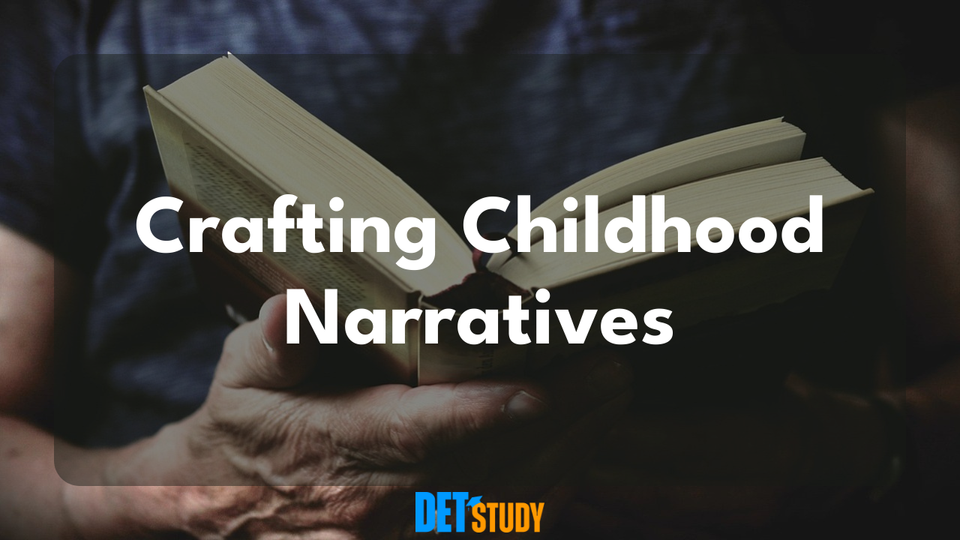Childhood Memories Paragraph: Crafting Nostalgic Narratives to Enhance English Language Skills

Childhood memories are a special part of one's life. They are like a treasure chest filled with moments that shape who we are as adults. These memories often bring back feelings of happiness, warmth, and sometimes sadness. They include simple joys like playing in the park, having ice cream on a hot summer day, or listening to bedtime stories.
As children, our experiences are fresh and new, making every small event seem extraordinary. Whether it's a family vacation, the first day of school, or a favorite toy, these memories help us remember the innocence and wonder of childhood. They often involve loved ones such as family and friends who played a big role in our early lives.
Remembering childhood moments can help us connect with our past and understand how we have grown. It also brings a sense of nostalgia and can remind us to appreciate the simple things in life. Reflecting on these memories allows us to share our personal stories and learn about the diverse experiences of others.
For many, childhood memories are a source of comfort and joy. They serve as a reminder of the times when life was simpler and full of possibilities. By recalling these moments, we can cherish the adventures and lessons from our youth and carry those feelings forward into our future.
The Importance of Childhood Memories
Childhood memories play a significant role in shaping who we are as individuals. They are the building blocks of our personality and influence our behavior, emotions, and decisions in adulthood. These memories are often vivid, filled with emotions, and can evoke strong feelings even years later.
For many, childhood is a time of exploration and learning. Memories from this period often include first experiences, such as the first day of school, learning to ride a bicycle, or family vacations. These experiences help develop our sense of identity and belonging.
Additionally, childhood memories can be a source of comfort and joy. Recalling happy moments, such as family gatherings, playing with friends, or special celebrations, can evoke feelings of warmth and happiness. These memories can provide solace during difficult times and remind us of a simpler, carefree time in our lives.
Moreover, childhood memories can teach valuable life lessons. They may illustrate themes of friendship, resilience, and love. For example, stories of overcoming challenges as a child can inspire perseverance and determination later in life.
Finally, childhood memories are essential for sharing family history and traditions. They connect different generations and preserve cultural heritage. Listening to elders recount their childhood stories allows us to understand and appreciate our roots.
In essence, childhood memories are a vital part of our personal history and identity. They help shape our present and influence our future in countless ways.
All 19 Duolingo English Test Question Types for 2025Common Themes in Childhood Memories
Childhood memories often revolve around a few common themes that many people can relate to, regardless of where they grew up. These themes capture the simple joys and impactful moments of our early years.
Family and Home
Family plays a crucial role in childhood memories. Many people reminisce about family gatherings, holidays, or traditions that brought everyone together. Memories of spending time with siblings, parents, or grandparents often evoke feelings of warmth and security. These memories might include family meals, bedtime stories, or family trips that were full of laughter and fun.
Friends and Play
Another common theme is the friends we made during childhood. The friendships formed during this period are often characterized by innocence and playfulness. Many memories revolve around playing in the schoolyard, having sleepovers, or engaging in imaginative games. These friendships help shape social skills and are often remembered fondly as times of adventure and exploration.
School Experiences
School is a significant part of childhood, and memories of school days are often vivid. These can include the excitement of the first day of school, favorite teachers who inspired us, or subjects that sparked our interest. School memories might also involve school trips, sports day, or the thrill of participating in school plays or science fairs.
Try Duolingo TestCelebrations and Milestones
Celebrations such as birthdays, festivals, or other cultural events are pivotal in shaping childhood memories. The anticipation of birthdays, with cakes, games, and gifts, creates joyful memories. Similarly, participating in cultural festivities can leave lasting impressions with sights, sounds, and tastes that become cherished recollections.

Nature and Outdoors
Many childhood memories are tied to experiences in nature and the outdoors. The freedom of playing in the park, exploring the woods, climbing trees, or going on family camping trips often leave lasting impressions. These experiences fostered a sense of wonder and curiosity about the world around us.
5 Tips for the Read Then Speak Question: Duolingo English TestChallenges and Lessons
Not all childhood memories are purely joyful. Some involve challenges or lessons learned through difficult times. Memories of facing fears, overcoming obstacles, or learning from mistakes contribute to personal growth. These experiences often teach resilience and shape our character in lasting ways.
Childhood memories play a significant role in shaping who we become as adults. These memories often lay the foundation for our values, beliefs, and behaviors. For instance, a child who frequently engaged in family gatherings may grow up valuing family relationships and community. On the other hand, a child who experienced encouragement and praise while attempting new activities might develop a love for learning and a strong sense of self-confidence.
Furthermore, childhood memories can influence our emotional responses. Positive experiences, such as traveling with family or playing with friends, often result in happy and nostalgic feelings. These positive memories can provide comfort and serve as a source of strength in challenging times.
Similarly, our early experiences with problem-solving and conflict resolution can shape how we handle difficulties as adults. A child who learned to deal with disagreements constructively might become an adult who negotiates well in the workplace. Meanwhile, a child who enjoyed exploring and discovering may develop into a creative thinker.
These early memories also guide our aspirations. A child who admired a kind teacher might aspire to teach, or someone who enjoyed building toys might pursue engineering. Through these examples, we see how childhood memories are not just fleeting moments; they are instrumental in shaping our future selves.
Overall, reflecting on childhood memories can help us understand various aspects of our adult lives and the paths we choose to follow.
Test Your EnglishPreserving and Reflecting on Childhood Memories
Childhood memories are like a treasure chest filled with moments of wonder and innocence. These memories often shape who we become as adults, influencing our values, behaviors, and even our dreams. Remembering the past can bring joy and a sense of nostalgia, helping us to reconnect with simpler times.
One way to preserve childhood memories is through storytelling. Sharing anecdotes about our past with family and friends can keep these moments alive. For English language learners, this practice also improves vocabulary and conversational skills. Try to initiate discussions or write short essays about your favorite childhood experiences, like your first day at school or a memorable family vacation.
Photographs and keepsakes are other excellent ways to hold onto our childhood. Looking through old albums can bring back vivid images of special events and everyday life during our younger years. Engage with these memories by describing what you see or feel in these photos. This exercise not only helps in language learning but also strengthens emotional connections to the past.
Journaling is another effective method for reflecting on childhood memories. By writing about past experiences, learners can practice grammar and structure while also exploring their emotions and thoughts. Start with simple prompts, such as describing childhood playtime activities or favorite toys, and gradually move to more complex narratives.
Lastly, music and smells often trigger powerful childhood recollections. Listening to a song your parents used to play or smelling a familiar dish can transport you back in time. Use these sensory experiences as a basis for language activities, like writing a reflection or composing a song that encapsulates your memories.
Preserving and reflecting on childhood memories enriches our lives in many ways. It helps build a sense of identity and continuity, while also offering a unique avenue for language practice and personal growth.
DET Study provides an extensive suite of over 15,000 practice questions, focusing on leveraging adjectives and adverbs to fortify your grammatical skills. Regular practice with these targeted materials ensures that you approach the Duolingo English Test with enhanced confidence and precision, ready to achieve your desired scores.
🎯 Need more practice? Check out DETStudy.com for expert resources, 15,000+ practice questions, and AI-powered writing and speaking feedback.
Frequently Asked Questions (FAQ)
Why are childhood memories important?
How can childhood memories affect an individual later in life?
What role do senses play in recalling childhood memories?

